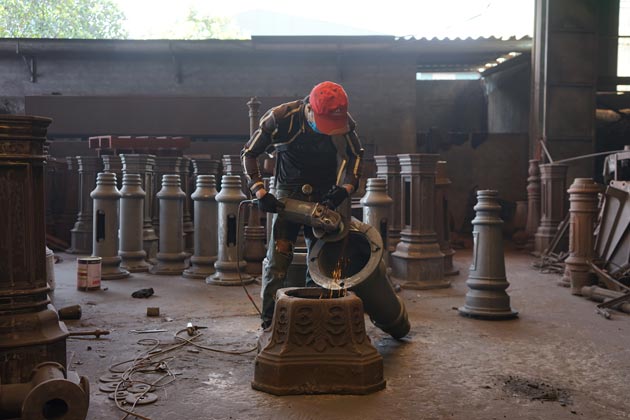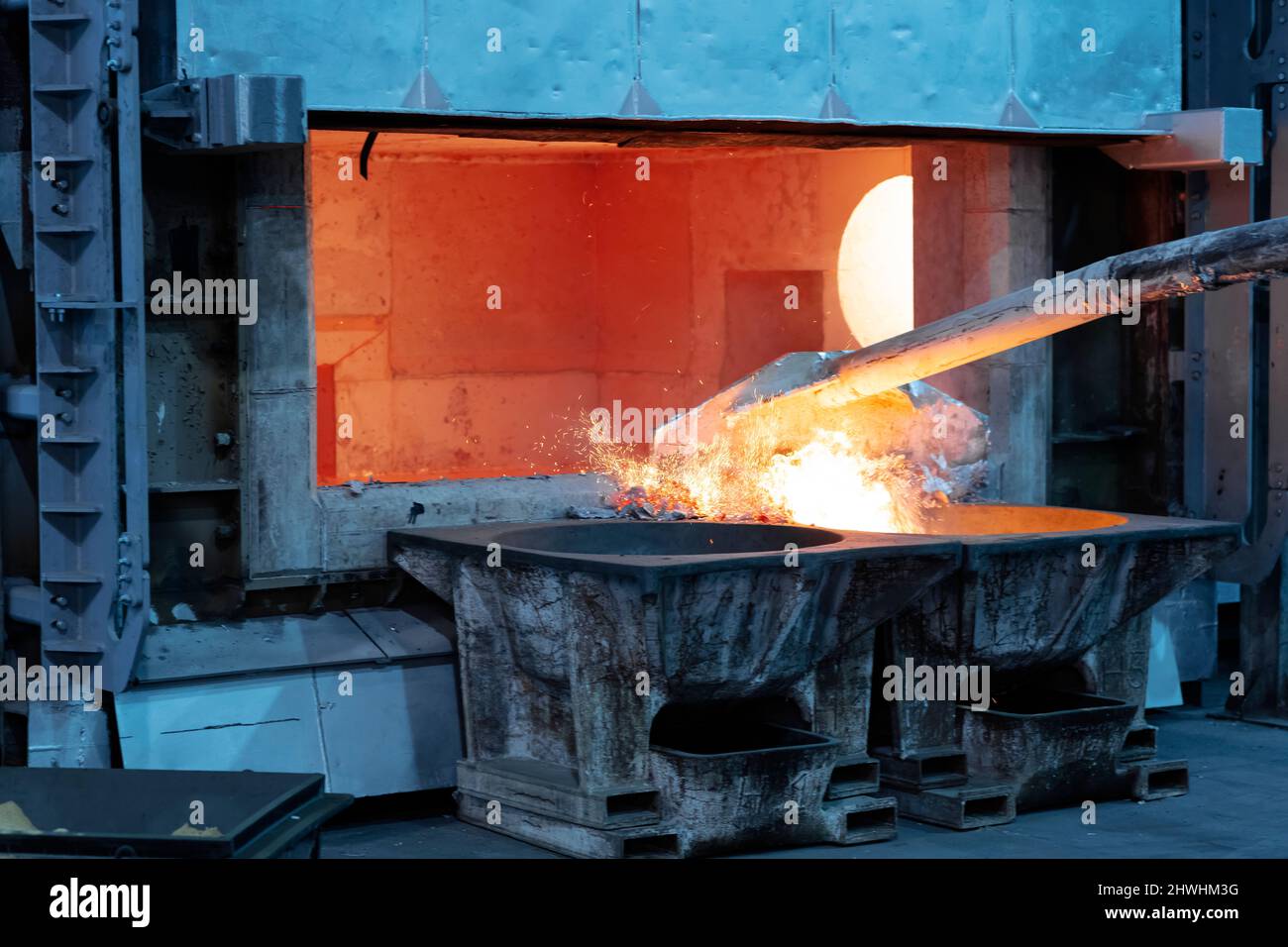Recognizing the Advantages and Innovations in the Aluminum Foundry Sector
The Aluminum Foundry sector plays an essential role in contemporary production. Its lightweight residential or commercial properties notably improve gas effectiveness, especially in aerospace and automobile industries. Furthermore, Aluminum's resistance to rust guarantees longevity in numerous applications. As the industry develops, innovations such as innovative recycling and additive manufacturing are improving manufacturing approaches. Exploring these improvements discloses not just the benefits yet additionally the obstacles in advance for Aluminum shops in a quickly transforming market.
The Lightweight Benefit of Aluminum
Aluminum's lightweight nature supplies substantial benefits throughout different sectors, especially in manufacturing and transport. Its low thickness enables for the production of elements that are simpler to set up and manage, resulting in minimized labor prices and improved effectiveness. In the auto field, lighter lorries add to enhanced gas economy and lower exhausts, aligning with international sustainability goals. In aerospace, the usage of Aluminum reduces the general weight of aircraft, which is important for boosting efficiency and reducing operational prices.
Furthermore, Aluminum's lightweight homes help with cutting-edge layouts that were formerly impractical with larger materials. This versatility makes it possible for makers to produce intricate shapes and structures while preserving structural integrity. Generally, the light-weight benefit of Aluminum not only improves item performance but additionally drives improvements in modern technology and design, making it a favored product in different applications.
Rust Resistance and Toughness
The Aluminum Foundry industry is renowned for creating products with exceptional rust resistance, making them optimal for numerous applications. This property, combined with boosted architectural stability, contributes to the lasting performance benefits that Aluminum parts supply. Therefore, sectors increasingly depend on Aluminum to satisfy requiring environmental problems without jeopardizing quality.
Superior Rust Resistance
While various steels deal with considerable difficulties from ecological factors, Aluminum attracts attention for its exceptional corrosion resistance, making it a preferred selection in several applications. This residential property is largely due to a natural oxide layer that bases on the Aluminum surface, offering a barrier versus moisture and corrosive representatives. Unlike various other steels that may rust or degrade in time, Aluminum maintains its stability even in rough settings, such as commercial settings or coastal areas. Furthermore, its lightweight nature combined with corrosion resistance makes it perfect for applications in aerospace, vehicle, and marine industries. On the whole, Aluminum's exceptional sturdiness not only boosts item longevity yet likewise decreases upkeep expenses, offering an engaging benefit for customers and suppliers alike.
Improved Architectural Integrity
Designers and developers significantly identify the relevance of improved structural stability in contemporary applications, where both corrosion resistance and durability are important. Aluminum alloys, known for their lightweight residential or commercial properties, likewise display remarkable resistance to corrosion, making them suitable for harsh atmospheres. The cutting-edge techniques employed in the Aluminum Foundry industry add substantially to creating parts with enhanced durability. Advanced casting processes and alloy make-ups are customized to satisfy certain efficiency needs, ensuring that frameworks can hold up against severe conditions without jeopardizing honesty. Additionally, surface treatments and coatings improve the life-span of Aluminum products, further minimizing degeneration with time. This focus on improved architectural integrity not only extends the functionality of materials but also reduces upkeep prices, strengthening Aluminum's position as a material of selection in different sectors.
Resilient Performance Conveniences
Resilient performance in Aluminum parts is largely credited to their superior corrosion resistance and resilience. Unlike many steels, Aluminum normally forms a protective oxide layer, which protects against corrosion and deterioration in numerous atmospheres, consisting of commercial and aquatic setups. This intrinsic residential property considerably extends the lifespan of Aluminum items, minimizing maintenance and substitute expenses. In addition, the lightweight nature of Aluminum improves its applicability throughout markets without compromising toughness. The product's resistance to use and tear additionally contributes to its integrity popular applications, making it a perfect option for vehicle, aerospace, and building and construction fields. As markets progressively prioritize sustainability and durability, Aluminum's efficiency advantages line up with modern-day design needs, solidifying its function in innovative production processes.
Ecological Effect and Sustainability
 As the Aluminum Foundry market evolves, it increasingly prioritizes ecological impact and sustainability, identifying the requirement for accountable practices when faced with climate adjustment. Initiatives to decrease waste and energy consumption go to the leading edge, with lots of shops embracing reusing campaigns to recover Aluminum scrap. This not only decreases resources use but also notably lowers power expense, as recycled Aluminum requires only a fraction of the power contrasted to main manufacturing.
As the Aluminum Foundry market evolves, it increasingly prioritizes ecological impact and sustainability, identifying the requirement for accountable practices when faced with climate adjustment. Initiatives to decrease waste and energy consumption go to the leading edge, with lots of shops embracing reusing campaigns to recover Aluminum scrap. This not only decreases resources use but also notably lowers power expense, as recycled Aluminum requires only a fraction of the power contrasted to main manufacturing.In addition, advancements in emissions control technologies are being carried out to lower air contaminants, lining up operations with more stringent ecological policies. Shops are also checking out different energy resources, such as solar and wind, to power their centers sustainably. By fostering cooperation with stakeholders, the sector aims to create cutting-edge remedies that improve eco-friendly stewardship. Collectively, these initiatives highlight a commitment to minimizing the Aluminum Foundry's carbon footprint while advertising a round economic situation within the manufacturing industry.
Advanced Production Techniques
 Changing production processes, the Aluminum Foundry market is increasingly incorporating innovative production strategies to boost efficiency and precision. Techniques such as computer mathematical control (CNC) machining and additive production have actually become necessary elements in enhancing production process. CNC machining enables high-precision component construction, considerably decreasing material waste and production time. Additive manufacturing opens up new opportunities for intricate geometries and light-weight layouts that were previously challenging to attain.
Changing production processes, the Aluminum Foundry market is increasingly incorporating innovative production strategies to boost efficiency and precision. Techniques such as computer mathematical control (CNC) machining and additive production have actually become necessary elements in enhancing production process. CNC machining enables high-precision component construction, considerably decreasing material waste and production time. Additive manufacturing opens up new opportunities for intricate geometries and light-weight layouts that were previously challenging to attain.Additionally, the release of automation and robotics in Aluminum foundries improves procedures, lessens human mistake, and improves employee security. These technologies help with an even more responsive production setting, allowing makers to adapt quickly to market demands. The assimilation of innovative simulation software even more boosts the design and screening stages, leading to exceptional product quality. Collectively, these strategies not just improve operational effectiveness however also foster advancement, positioning the Aluminum Foundry industry at the forefront of contemporary manufacturing.
Innovations in Reusing Procedures
The Aluminum Foundry sector is not just progressing in making techniques yet is likewise making significant strides in reusing processes. Advancements are arising to enhance the effectiveness of recycling techniques, decreasing power intake and boosting sustainability. Advanced arranging innovations, such as computerized optical sorting, enable the identification and separation of Aluminum from other products with high precision. This results in a higher top quality of recycled Aluminum, which is crucial for preserving the integrity of the end products.
In addition, closed-loop recycling systems are being implemented, allowing makers to reuse Aluminum scrap within their very own production processes. This lessens waste and advertises a round economic situation. Additionally, research study into brand-new recycling techniques, such as hydrometallurgical processes, supplies the possibility for recovering Aluminum from complicated waste streams. These advancements not only contribute to reducing the carbon footprint of the Aluminum Foundry sector however also reinforce its economic feasibility in an increasingly environmentally mindful market.
Applications Across Numerous Industries
Various sectors visit homepage are significantly identifying the versatility and benefits of Aluminum Foundry items, leading to extensive applications throughout fields such as auto, aerospace, customer, and building items. In the automobile sector, Aluminum spreadings add to lightweight vehicle layouts, boosting gas efficiency and performance. Aerospace makers make use of Aluminum elements for their strength-to-weight proportion, necessary for aircraft frameworks and components.
In building and construction, Aluminum is favored for its toughness and resistance to corrosion, making it ideal for home window structures, roofing, and structural supports. Durable goods likewise take advantage of Aluminum Foundry items, as seen in kitchenware, electronic devices, and product packaging, where light-weight and recyclable materials are crucial.
The versatility of Aluminum Foundry methods permits for accurate specs and elaborate layouts, accommodating the diverse requirements of these markets. As a result, Aluminum Foundry products are becoming essential to modern-day manufacturing procedures throughout various sectors.
Future Trends in Aluminum Foundries
As industries remain to develop, Aluminum factories are poised to embrace numerous key trends that promise to boost efficiency and sustainability. One prominent trend is the enhancing fostering of electronic technologies, including automation and fabricated intelligence, which simplify operations and boost quality assurance. Additionally, the push towards sustainable techniques is leading shops to buy recycling innovations, significantly reducing waste and energy usage.
 An additional emerging fad is using advanced alloys and products, satisfying the expanding need for light-weight and resilient components throughout numerous sectors (Aluminum Foundry). Moreover, the integration of additive manufacturing strategies is anticipated to transform component style, providing customization and lowering lead times
An additional emerging fad is using advanced alloys and products, satisfying the expanding need for light-weight and resilient components throughout numerous sectors (Aluminum Foundry). Moreover, the integration of additive manufacturing strategies is anticipated to transform component style, providing customization and lowering lead timesPartnership with research institutions is additionally expected to drive technology, as foundries look for to establish new procedures and materials. Aluminum Foundry. Collectively, these trends indicate a transformative future for the Aluminum Foundry market, aligning with more comprehensive goals of sustainability and effectiveness
Often Asked Concerns
What Are the Common Expenses Connected With Aluminum Foundry Production?
The typical costs related to Aluminum Foundry manufacturing consist of basic materials, labor, energy, equipment upkeep, and overhead expenditures. These variables jointly influence the overall monetary investment required for reliable Aluminum spreading procedures.
Exactly How Does Aluminum Compare to Various Other Steels in Stamina?
Aluminum, while lighter than numerous metals, shows excellent strength-to-weight ratios. Compared to steel, Aluminum is less strong however uses excellent deterioration resistance, making it a favorable choice in applications where weight and durability are important.
What Precaution Are in Place in Aluminum Foundries?
Safety and security procedures in Aluminum foundries typically consist of compulsory personal safety devices, ventilation systems to regulate fumes, routine equipment upkeep, training programs for workers, and adherence to stringent security laws to minimize risks connected with molten steel handling.
How Is Quality Assurance Managed in Aluminum Casting Processes?
Quality assurance in Aluminum spreading processes includes rigorous inspections at different stages, consisting of raw material analysis, process surveillance, and final item testing. Strategies such as statistical procedure control and non-destructive testing assurance adherence to market criteria.
What Accreditations Are Necessary for Aluminum Foundry Providers?
The relevance of certifications for Aluminum Foundry vendors consists of ISO 9001 for quality monitoring, ISO 14001 for ecological administration, and industry-specific criteria like ASTM and SAE, guaranteeing conformity, safety, and integrity in producing processes.
The Aluminum Foundry sector plays an important function in contemporary production. The Aluminum Foundry market is renowned for creating products with premium deterioration his explanation resistance, making them perfect for various applications. Transforming production procedures, the Aluminum Foundry industry is progressively integrating sophisticated production strategies to boost efficiency and precision. The Aluminum Foundry market is not only advancing in making techniques but is likewise making substantial strides in reusing processes. As markets proceed to develop, Aluminum shops are poised to welcome a number of key trends that assure to improve efficiency my link and sustainability.